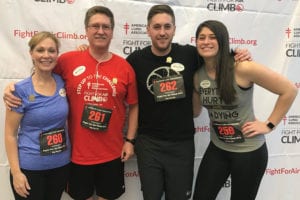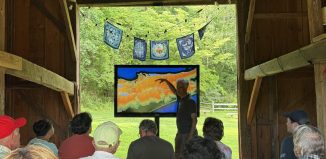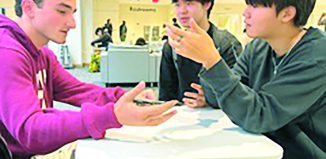By Rita J. Egan
When James Riordan, 82, died in 2016 after battling lung cancer, many would think his greatest contribution to the world was his involvement with the Apollo 13 space mission. But to his relatives, it was his sense of family and kindness that touched others most.
Inheriting his sense of generosity, the former Stony Brook resident’s family participated in the American Lung Association Fight for Air Climb April 1 for the second straight time, raising $1,512 for the cause in his memory. This year’s event included 600 participants climbing the 55 flights of stairs at One Penn Plaza, a New York City skyscraper, the equivalent of 1,210 steps.
Granddaughter Jessica Frisina, of Rocky Point, organized Team Apollo in honor of her fond memories of the aerospace engineer with the Northrop Grumman Corporation.

“He was completely humble,” she said. “He was so willing to help anybody and everybody. He just wanted to lend a helping hand to anyone that was willing to take it — just a generous and kind person. He didn’t have a mean bone in his body.”
Riordan, who lived in Stony Brook with his wife Ruth since 1964, was an integral member of the Apollo 13 mission. Due to his work helping to direct the team on the construction of the Lunar Excursion Module and its safe return, he received the Presidential Medal of Freedom from President Richard Nixon in 1970 along with his fellow members of the Apollo 13 Mission Operations Team.
His son Bob Riordan, Frisina’s stepfather, said while growing up he and his siblings didn’t realize just how important their father’s job was. It wasn’t until they were going through their father’s books, or hearing from friends who worked at Grumman, that they realized just how much he had accomplished.
He said they were amazed that their father was in the control room during the Apollo 13 mission and treasure the book “Race to the Moon,” where James Riordan is pictured in a control room with astronaut Neil Armstrong.
“We can’t believe we had a father who did this for a living,” Bob Riordan said.
The son said he isn’t surprised his father didn’t talk much about his work though, because of his modesty.
“He never cared about keeping up with the Joneses,” he said. “All he ever cared about was his family.”
James Riordan suffered from chronic obstructive pulmonary disease, the early stages of emphysema, and about a year before his passing, he was diagnosed with stage 0 lung cancer. His son said his father smoked for decades, starting as a teenager.
Frisina said she got the idea to start the Fight for Air Climb team after her grandfather’s death, and Riordan said he wasn’t surprised.
“He was so willing to help anybody and everybody. He just wanted to lend a helping hand to anyone that was willing to take it — just a generous and kind person.”
—Jessica Frisina
“I was so proud of her for doing that, but that’s the kind of person Jessica is,” he said.
Frisina said while the Riordans are her stepfamily, she considers them family all the same. Riordan said his father and stepdaughter hit it off as soon as they met when she was 7 years old.
“They took a liking to each other the first day they met,” Riordan said. “I always felt kind of emotional when those two were together. He was the type of man that any children who came into his life just took to him — that’s just the type of guy he was.”
While joining the Fight for Air Climb was a last-minute decision in 2016, with only a few relatives being able to come out and cheer them on, this year she said almost a dozen family members came out to show support for her, Riordan, her stepbrother Matt Riordan and her aunt Kathy Bern, who traveled from North Carolina.
Frisina said she looks forward to participating in the event again next year and knows participation from the family will only continue to grow.
Her uncle Jim Riordan was on hand this year to show support. He said Frisina always had a great appreciation for his father.
“She is by every definition a grandchild in this family,” he said.
Bob Riordan said he was in better shape for this year’s event after finding out how difficult the climb was last year.
“The first time I did it, I thought I was going to join my father,” Riordan joked.
Frisina said climbing the 55 flights of stairs is supposed to simulate how it feels to have a lung ailment, and once you pass flight 10, it becomes more and more difficult to breathe.
“It initially feels amazing to complete something like that,” Frisina said. “But in reality, it makes you think as you’re doing it. [My grandfather] had to deal with this every day — feeling like this and overcoming walking and not being able to breathe. It makes you put yourself in somebody else’s shoes who’s dealing with it.”







